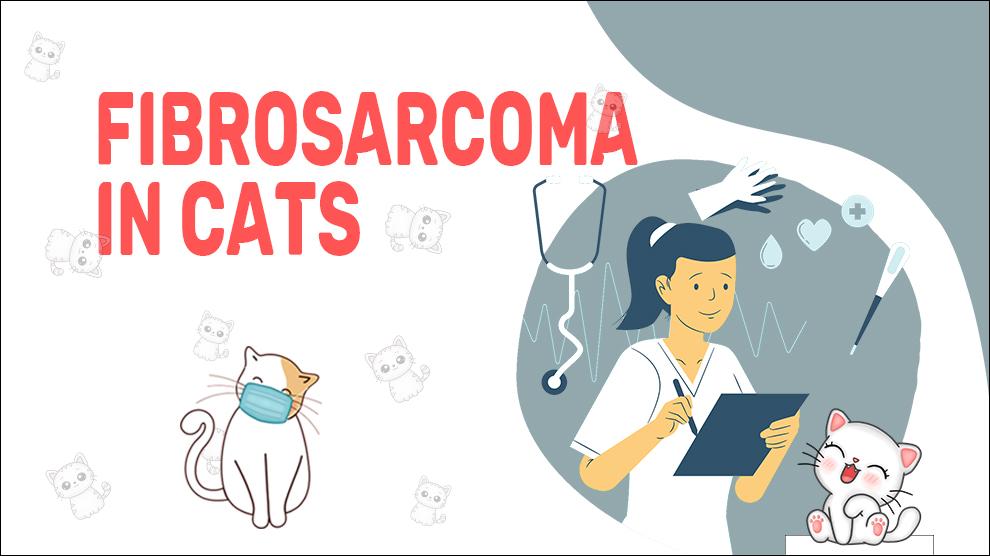What Is Fibrosarcoma In Cats?
Fibrosarcoma is a cancer that arises from fibroblasts, the cells responsible for producing connective tissue.
Fibrosarcomas can develop in any part of a cat's body, but they are most commonly found in the skin, subcutaneous tissue (the layer of tissue just beneath the skin), and muscle.
The tumor is typically slow-growing, but it can be locally aggressive, invading nearby tissues and structures. Fibrosarcoma is most often seen in middle-aged and older cats, with no particular gender or breed predilection.
Clinical Signs Of Fibrosarcoma In Cats
The symptoms of fibrosarcoma in cats can vary depending on the location of the tumor.
In some cases, the tumor may be small and asymptomatic, while in others, it can cause pain, lameness, or swelling.
Some common symptoms of fibrosarcoma include:
- A lump or bump that grows in size over time
- Swelling or thickening of the skin
- Difficulty breathing or eating (if the tumor is located in the chest or throat)
- Lameness or limping (if the tumor is located in a limb)
- Discharge or bleeding from the tumor
- In some cases, cats may not show any symptoms until the tumor has grown to a significant size.
- Difficulty Eating
- Lack Of Appetite
- Loss Of Skin Elasticity
- Sunken Eyes
- Pale Gums
- Lethargy
- Difficulty Walking
- Bleeding In Mouth
Treatment Options For Fibrosarcoma In Cats
Treatment for fibrosarcoma in cats depends on the location and severity of the cancer. Surgery is often the first line of treatment, and it involves removing as much of the cancerous tissue as possible.
Radiation therapy may also be used to kill any remaining cancer cells. Chemotherapy is another option, although it is generally reserved for more advanced cases of fibrosarcoma.
Pain management and supportive care may also be necessary to help the cat manage any discomfort and maintain a good quality of life.
Home Remedies For Fibrosarcoma In Cats
There are no home remedies or specific dietary recommendations for treating fibrosarcoma in cats.
How To Prevent Fibrosarcoma In Cats?
There is no guaranteed way to prevent fibrosarcoma in cats, but there are some steps that cat owners can take to reduce their cat's risk.
These include:
- Keeping the cat indoors to reduce their exposure to environmental toxins and other potential carcinogens
- Providing a balanced and nutritious diet to help support the cat's immune system
- Regular veterinary check-ups to monitor the cat's overall health and catch any potential health issues early on
- Avoiding unnecessary exposure to radiation and other potentially harmful chemicals
Affected Cat Breeds Of Fibrosarcoma
While any cat can develop fibrosarcoma, some breeds may be more prone to the disease than others.
Siamese and Himalayan cats are thought to be at a higher risk of developing fibrosarcoma than other breeds.
Causes For Fibrosarcoma In Cats
Causes:
The exact causes of fibrosarcoma in cats are not well understood, but there are some factors that may increase a cat's risk of developing the disease.
These include:
- Age: Fibrosarcoma is most commonly seen in middle-aged and older cats.
- Breed: Some breeds of cats, such as Siamese and domestic shorthair, may be more predisposed to developing fibrosarcoma.
- Gender: There is no clear gender predilection for fibrosarcoma in cats.
- Exposure to carcinogens: Exposure to certain chemicals or radiation may increase a cat's risk of developing fibrosarcoma.
When To See A Vet For Fibrosarcoma In Cats?
If cat owner notices any unusual lumps, bumps, or other changes in their cat's behavior or appearance, they should contact their veterinarian as soon as possible.
Early detection and prompt treatment can help to improve the cat's prognosis and increase its chances of recovery.
Food Suggestions For Fibrosarcoma In Cats
Providing a balanced and nutritious diet can help to support the cat's immune system and overall health, which may aid in its recovery.
It is important to work closely with a veterinarian to develop a comprehensive treatment plan for the cat.
Conclusion
Fibrosarcoma is a type of cancer that can be aggressive and difficult to treat, but early detection and prompt treatment can help to improve the cat's prognosis.











